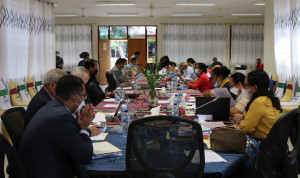Government and Parliamentary Committees C and D begin detailed discussion of the Draft Law on Budgetary Framework and Management of Public Finances

On July 23rd, 2021, the Minister of Finance, Rui Augusto Gomes, accompanied by the team from the Legal Support Office of the Ministry of Finance, participated in a detailed discussion session on the Budgetary Framework and Public Finance Management Law (PPL - LEO) with Committee C, which deals with Public Finance matters, and Committee D, which deals with Economic and Development matters.
The reason for this discussion with Committee C and Committee D of the National Parliament has to do with the complexity of the content of the PPL - LEO, and so the two parties can discuss the proposals and seek consensus, both internally in the National Parliament, as well as between Parliament and Government, before the proposal returns to Plenary for discussion and overall final approval.
The PPL - LEO is one of the results of the long process of Financial Reform, initiated in 2015 by the 6th Constitutional Government, and in relation to which the previous Government has already made some improvements, through a discussion that already takes several years.
The PPL - LEO introduces 11 budgetary principles, namely: Unity and Universality; Annuality and Pluriannuality; Budget Stability and Sustainability; Economy, Efficiency and Effectiveness; Transparency; Accountability; Intergenerational Equity; Budgeting by Programmes; Specification; Non-Compensation; and lastly, Non-Consignment.
Through this PPL - LEO, the Government also proposes to make substantial changes in some aspects that are very essential to the budgetary framework and the management of public finances, with the aim of further strengthening the relationship between planning and budgeting, through a programme budgeting that focuses on results.
Since 2015, the 5th Constitutional Government has developed advocacy work related to the Fiscal Reform and Public Finance Management, through the phased implementation of programme budgeting, eliminating the practice of off-budgeting, increasing the autonomy of services and improving transparency in budget execution.
In 2019, the 8th Constitutional Government started the drafting of the PPL - LEO and recently, in January 2021, submitted it to the National Parliament. The delay in this legislative process may impact on the implementation of these important reforms, initiated, as already mentioned, by the 5th Constitutional Government and that the VIII Constitutional Government remains committed to promote.
During the process of preparing, drafting and discussing the PPL - LEO, the Government of Timor-Leste and the National Parliament also carried out a set of consultations with the economic and social sectors, namely with the Central Bank of Timor-Leste, the RAEOA, the Social Security, the Chamber of Accounts, the Petroleum Fund Consultative Council, FONGTIL, the NGO La'o Hamutuk and the International Monetary Fund. The PPL - LEO itself also includes some recommendations that have been requested by the economic and social sectors, and complies with international best practices recommended in the Article IV Task Team Report of the International Monetary Fund and the Public Expenditure and Financial Accountability Report of the World Bank.
The 8th Constitutional Government remains committed to finalizing the PPL - LEO, so as to implement these important Reforms, which should have been implemented some years ago. Through the implementation of these important reforms, the economy of Timor-Leste will develop and future generations will benefit.
On July 6th, 2021, the National Parliament, in plenary session, overall approved the Draft Law no. 27/V/3ª - Law on the Framework of the State Budget and Public Financial Management, with 37 votes in favour (61%), 12 votes against and 11 abstentions.
In the overall debate, the opinion of the Committee C of the National Parliament was mostly positive, and the objections included in the report have already been transformed into proposals for amendment, for the debate during the detailed discussion, and the Government is open to discussing these amendment proposals.
After the overall approval, the Parliament plenary also deliberated, with 44 votes in favour (72%), 17 abstentions and zero votes against, to submit the detailed discussion of the PPL - LEO to Committee C of the National Parliament, which deals with Public Finance matters.
This plenary session was chaired by the President of the National Parliament, His Excellency Aniceto Longuinhos Guterres Lopes, accompanied by the members of the Board of the National Parliament, and was attended by the Minister of Finance, Rui Augusto Gomes and the Vice Minister of Finance, Sara Lobo Brites, as the proponents of this Draft Law.










































